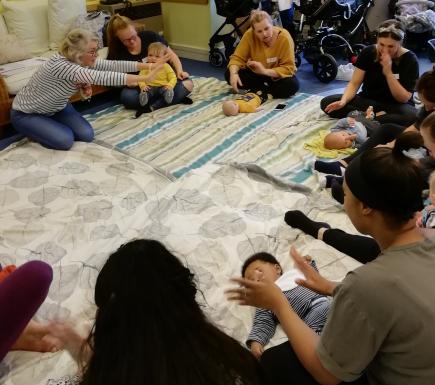Blog: 3 key messages from new Sure Start research for organisations using Peep Programmes
The new research by the IFS into the impact of Sure Start on children's outcomes was a brilliant validation of the premise on which most of us work. Early intervention can be cost-effective and make a real, positive difference to narrowing the gap in children's outcomes. Sure Start and later Children’s Centres created a one-stop shop for families, bringing together pre and post-natal health services, parenting support including for children with SEND, early learning and childcare, and parental employment support. Similar goals were echoed in Scotland (e.g. through GIRFEC, Getting it right for every child), the Republic of Ireland (e.g. with local Area Based Childhood (ABC) Programmes), and in Australia (through the Playgroup movement).
How is it relevant to Peep practitioners today?
1. Reaching and engaging the families who might benefit the most
As the IFS research found, the positive impacts of Sure Start were greater for the children who lived near the earlier – and better-funded – Sure Start Local Programmes. ‘Much of this extra budget was spent on parental outreach, focused on reaching out to families who were less likely to use and more likely to benefit from Sure Start.’
Most of us these days don't have that same level of funding, BUT there are things we can do to encourage all families to come along. Over the years we have learned from other research on reaching families and gathered tips and experiences from Peep practitioners.
> You can find a list of these practical ideas on the 'Recruiting families and promoting your Peep sessions' page in the login Delivery Support section of the website. If you’re a manager who doesn’t have a login account, just email us at support@peeple.org.uk and we can send you a PDF version of the info. It includes successful recruitment strategies recommended by Peep practitioners, and an action plan of ideas.
2. Having a friendly and good quality offer for families - with a focus on strengthening relationships and narrowing the attainment gap
As well as focusing on outreach, the earlier Sure Start Local Programmes ‘had much more community input into what programmes were offered.’ The Peep Learning Together Programme has a wide range of topics that practitioners and families can choose from, with a common underpinning theme of helping to improve relationships and the quality of the home learning environment. All Peep programmes offer a strengths-based approach, starting where families are, and valuing and building on what they already do.
The IFS research found that children who lived within 2.5km of a Sure Start centre for their first five years performed 0.8 grades better in their GCSEs. However, the effects were six times greater for those eligible for free school meals than for those who weren’t, with an average improvement of three GCSE grades (e.g. getting 3 Cs rather than 3 Ds).
A similar trend was found in the Peep Learning Together Study, a randomised controlled trial (RCT), which measured the impact of the Learning Together Programme on three year olds. Overall the Programme made a positive difference of an additional two months’ progress over a five-month period to children’s early literacy development. But children eligible for the Early Years Pupil Premium made three months' additional progress in early literacy development, and an additional four months' progress in core language skills and in communication.
3. Having a joined-up approach for families is effective and provides value for money
Families involved with Sure Start benefitted from a multi-agency approach to working. Peep-trained practitioners have often found that a joined-up approach adds value for families. This could be by co-delivering their Peep sessions with a practitioner from a different discipline or organisation (as we do locally through our Growing Minds project), or involving other professionals as ‘signposters’ when reaching out to families.
It’s now widely accepted (if not always well-funded) that starting as early as possible – the first 1001 days – can make a real difference. Fore-warned is fore-armed! The Peep Antenatal Programme helps expectant parents understand more about how they can strengthen parent-child bonding and attachment relationships, and about early brain development. The approach can be used in any context, including alongside other antenatal provision.
The expansion in Early Learning and Childcare has been accompanied by a wider recognition of the importance of the ‘early learning’ aspect. Early years settings often deliver Peep programmes for families to strengthen relationships between the setting and families, and to bring together home and setting experiences, information and ideas that support young children’s development.
Parental employment support is another important aspect of joined-up, holistic services, helping to alleviate family poverty and increase opportunities for parents. The Peep Progression Pathway enables Peep practitioners to deliver and assess credit-rated units for families, as part of their Peep sessions. This has led to parents getting back into further education, training or work.
The Sure Start research is a timely reminder of the value – financial and otherwise – of early intervention. Earlier Sure Start research revealed that almost a third of the cost was covered by savings made from reduced hospitalisations of children in Sure Start areas. The IFS (Institute for Fiscal Studies – an independent economics research institute) estimated that Sure Start also resulted in an 8% saving in SEND support, and that the improved school outcomes were equivalent to a benefit of £1.09 for every £1 spent. We all have a part to play in holding governments to account in thinking about the longer term benefits for families in their policy-making.

find out more or book training
tel 01865 397 970
training@peeple.org.uk
> training courses
> dates & booking
> sign up to our e-newsletter
